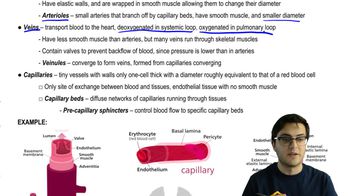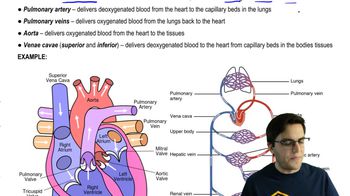Circulatory and Respiratory Anatomy definitions Flashcards
 Back
BackCirculatory and Respiratory Anatomy definitions
1/10
Terms in this set (10)
- CirculationThe process of transporting oxygen to cells for cellular respiration and removing carbon dioxide waste via the cardiovascular system.
- Respiratory SystemSystem responsible for gas exchange, taking in oxygen and expelling carbon dioxide, involving structures like lungs, trachea, and alveoli, and driven by the diaphragm's movement.
- Cellular RespirationThe process by which cells convert glucose and oxygen into energy (ATP), carbon dioxide, and water, involving glycolysis, the citric acid cycle, and the electron transport chain.
- Systemic CirculationThe process where oxygenated blood is transported from the heart to the body's tissues and deoxygenated blood is returned to the heart, facilitating gas exchange and nutrient delivery.
- VasculatureA network of blood vessels, including arteries, veins, and capillaries, that transport blood throughout the body, facilitating the exchange of gases, nutrients, and waste products.
- EndotheliumA thin layer of specialized epithelial cells lining the interior surface of blood and lymphatic vessels, playing a crucial role in vascular function, including blood flow regulation and barrier formation.
- VeinsBlood vessels that carry blood back to the heart, often containing valves to prevent backflow and relying on skeletal muscle contractions to aid blood flow due to lower pressure compared to arteries.
- CapillariesTiny blood vessels with walls one cell thick, facilitating the exchange of oxygen, carbon dioxide, nutrients, and waste between blood and tissues. They form networks called capillary beds for maximum surface area.
- HemoglobinA protein in red blood cells that binds oxygen via iron-containing heme groups, facilitating oxygen transport from lungs to tissues and carbon dioxide removal from tissues to lungs.
- Diaphragm.A muscle sheet separating the thoracic and abdominal cavities, contracting to create negative pressure for lung ventilation.



